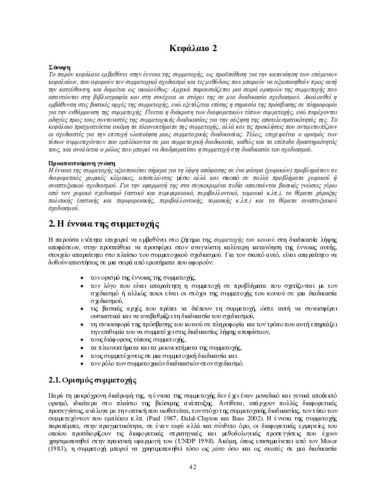| Title Details: | |
|
THE CONCEPT OF PARTICIPATION |
|
| Authors: |
Stratigea, Anastasia |
| Reviewer: |
Siolas, Angelos |
| Subject: | ENGINEERING AND TECHNOLOGY > TECHNOLOGICAL SCIENCES AND ENGINEERING > REGIONAL AND URBAN PLANNING |
| Keywords: |
Policy
Participation Local Development Participatory Planning Goals Of Participation Principles Of Participation Level Of Participation Types Of Participation Advantages Of Participation Participants Types Of Participants Participatory Process Challenges Of Participation Levels Of Participation Role Of Participation In Planning |
| Description: | |
| Abstract: |
The present chapter aims at providing insight into the concept of participation so that the reader can enrich his/her knowledge on this specific concept. This knowledge forms the ground for a better understanding of the content of subsequent chapters on participatory planning and the methods of participation that can be used towards this direction. The structure of the chapter has as follows: first it elaborates on the definition of the concept of participation, by presenting different literature views; next the objectives of participation in the planning process are discussed; it follows an insight into the basic principles of participation, while it is also stressed the importance of access to information by participants as a factor increasing their capacity and thus encouraging willingness to participate; then is presented a classification of the various types of participation, followed by recommendations addressed to the coordinators of a participatory process for enhancing its effectiveness; also advantages of participatory planning, but also challenges faced by planners for a successful implementation of participatory processes are discussed; while the final sections elaborate on the concept of participants and the different levels of their activity in a participatory process, as well as the role of participation in participatory planning exercises.
|
| Table of Contents: |
The structure of the chapter has as follows:
2. The Concept of Participation 2.1. Definition of Participation 2.2. Objectives of Participation 2.2.1. Communication and public relations 2.2.2. Gathering of information 2.2.3. Conflicts’ management 2.3. Basic Principles of Participation 2.4. Access to Information and Level of Participation 2.4.1. Access to information 2.4.2. Level of participation 2.5. Types of Participation 2.5.1. Differentiation according to the institutional base of the participatory process 2.5.2. Differentiation according to the passive or proactive nature of the participatory process 2.5.3. Differentiation according to the approach of the participatory process 2.5.4. Differentiation according to the level of engagement of participants 2.5.5. Differentiation according to the hierarchical level of decision-making 2.5.6. Differentiation according to the breadth of participation 2.5.7. Differentiation according to the stage of the planning process participation is implemented 2.6. Effectiveness of Participation – The Role of Coordinator 2.7. Advantages of Participation 2.8. Challenges for the Effective Implementation of Participation 2.9. The Participants 2.9.1. Who are the participants 2.9.2. Level of activity of participants 2.10. The Role of Participation in Planning |
| Linguistic Editors: |
Pantos, Panagiotis |
| Type: |
Chapter |
| Creation Date: | 2015 |
| Item Details: | |
| License: |
http://creativecommons.org/licenses/by-nc-sa/3.0/gr |
| Handle | http://hdl.handle.net/11419/5429 |
| Bibliographic Reference: | Stratigea, A. (2015). THE CONCEPT OF PARTICIPATION [Chapter]. In Stratigea, A. 2015. THEORY AND METHODS OF PARTICIPATORY PLANNING [Undergraduate textbook]. Kallipos, Open Academic Editions. https://hdl.handle.net/11419/5429 |
| Language: |
Greek |
| Is Part of: |
THEORY AND METHODS OF PARTICIPATORY PLANNING |
| Number of pages |
40 |
| Typical Learning Time: |
PT08H00M00S |
| Version: |
1st edition |
| Publication Origin: |
Kallipos, Open Academic Editions |


